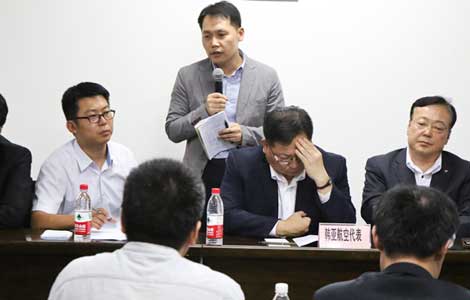Zhengzhou starts rail cargo service to Hamburg
Updated: 2013-07-19 07:31
By Zhong Nan in Beijing and Xiang Wenchao in Zhengzhou (China Daily)
|
||||||||
Responding to rising trade volumes, Zhengzhou, a business and logistic center in Central China, has started rail service to Hamburg, Germany.
The train takes 18 days to make the 10,214-kilometer trip, but that's more than twice as fast as maritime transport. It can also effectively save 80 percent of the cost compared with air shipments, and it's about $489 cheaper on average compared with road transportation, which is a major incentive for the Eurasian Land Bridge, also dubbed New Silk Road.
The route reaches Germany via Kazakhstan, Russia, Belarus and Poland. Zhengzhou International Inland Port Development Co Ltd is responsible for cooperating with partner rail companies in each country.
The containers have to be transferred by crane to different gauges twice. First comes a change to the Russian style broad gauge line at the Kazakhstan-China border at Alashankou, in northeastern China's Xinjiang Uygur autonomous region. The second is a transfer to standard gauge at the Polish-Belarusian border.
DB Schenker, the transport and logistics arm of Deutsche Bahn (Germany's national railway) is the rail route's main partner outside China. It provides gauge transfer and technical services through its service network in Central Asia and East Europe after the trains leave China.
"It can save a lot of time and money to import German electronic products, construction machinery, vehicles and parts, medical equipment and other high value-added products through this new international rail route," said Karl-Heinz Emberger, managing director of Central and North China, DB Schenker (China) Ltd.
China-Europe trade fell 3 percent year-on-year in the first half, to $259.21 billion. However, China remains Germany's biggest trade partner, with bilateral trade of $189.35 billion in 2012.
"The degree of interdependence between China and Germany continues to deepen with surging bilateral cross-industry trade. China is exporting consumer goods in exchange for Germany's high-tech products.
"Thus, most of their imports are complementary. It isn't direct competition," said Luo Renjian, a researcher at the Institute of Transportation Research under the National Development and Reform Commission.
China is focusing on developing high-end manufacturing and curbing energy-intensive industries during the 12th Five-Year Plan (2011-15).
Germany is proficient in producing green energy, biomedicine, high-efficiency engines, new materials, energy-saving products and information technology.
The Zhengzhou-Europe freight route will be joined by three other cargo rail services by year end. Henan will be able to transport goods to Almaty in Kazakhstan, Moscow and the port city of Klaipeda in Lithuania through this route.
Luo said German economic and trade cooperation with China will rise for a long time. Capable Chinese companies are also inclined to acquire German companies to gain cutting-edge technology, especially in chemistry, telecommunications, construction machinery, biology and steel.
Chinese companies invested $2.1 billion last year in Germany to acquire quality German companies and technology.
"With many manufacturing companies moving their facilities to both Germany and inland China, there is an increasing need for logistics and transportation services in these two fast-growing markets," said Cui Shaoying, director of the Zhengzhou Economy and Technology Development Zone.
Cui said the rail freight using the Eurasian land bridge will speed up access to key markets in Europe.
The first freight train had 41 containers, including 11 containers of vehicle parts, industrial yarn, high-end shoes and clothing en route to Hamburg, 29 containers of abrasive headed to Belgium's Antwerp and one container of garments destined for Rotterdam, the Netherlands. The goods are valued at $2.33 million.
Zhengzhou's importance as an economic driver in China's central region has been growing in recent years, and it is emerging as the next high-tech manufacturing area in China.
Qi Xin contributed to this story.

 Detroit files biggest ever US municipal bankruptcy
Detroit files biggest ever US municipal bankruptcy
 Plane crash victims' parents seek answers
Plane crash victims' parents seek answers
 'Improving' Mandela marks 95th birthday
'Improving' Mandela marks 95th birthday
 Qingdao eatery finds use for pesky seaweed
Qingdao eatery finds use for pesky seaweed
 From university campus to boot camp
From university campus to boot camp
 FIFA head: World Cup in Brazil could be mistake
FIFA head: World Cup in Brazil could be mistake
 Bomber as rock star? Rolling Stone cover outrage
Bomber as rock star? Rolling Stone cover outrage
 German band performs with 3D stage set
German band performs with 3D stage set
Most Viewed
Editor's Picks

|

|

|

|

|

|
Today's Top News
Obama weighs canceling Moscow talks with Putin
Pentagon to field 4,000-person cyber squad
NSA implements new security measures
Detroit files biggest ever US municipal bankruptcy
China's Sansha city dock begins operating
Yuan: Collateral types to expand
Autopsy ordered for Hunan fruit seller
Plane crash victims' parents seek answers
US Weekly

|

|






